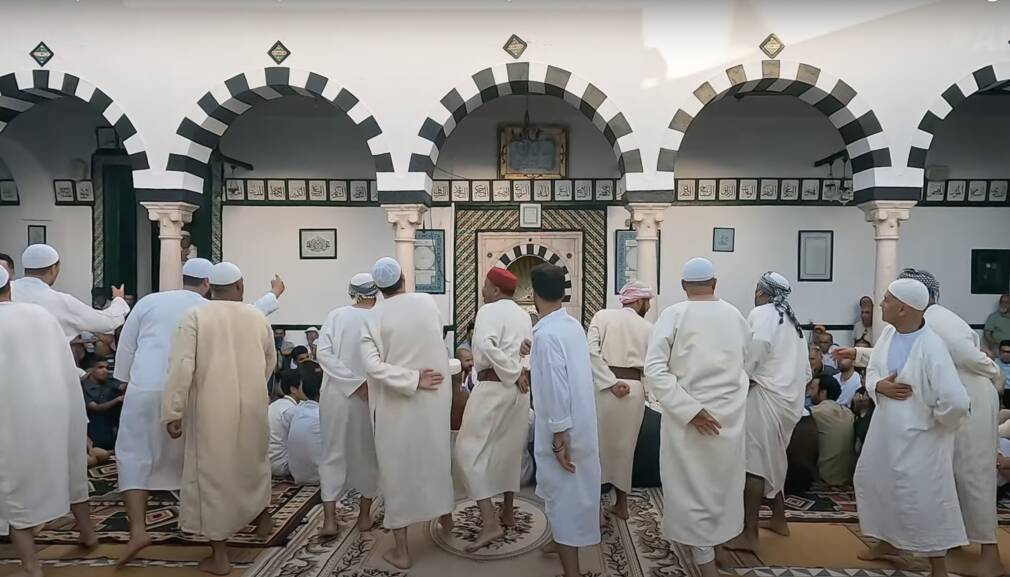Khalil Epi, electronic memories of Tunisia
This new episode of the Off the Map series takes you to Tunis to meet Khalil Epi, one of the most innovative creatives on the Tunisian electronic scene. He’s been on a mission for almost two decades, weaving a thread through traditional music, pop, European club and North African art music. A film by Fatma Ben Aissa.
“Paradoxical, turned towards the past, but also connected and contemporary…” So speaks Khalil Epi of his city, Tunis, in our new episode of the Off the Map series. It’s amazing to think that these words can be applied to his own music. A musical ensemble without blinkers, born of a Mediterranean melting pot, in which we find jazz and rock foundations, reminiscences of a film school, a love of analog grooves and European technoid rhythms. Khalil is the son of Mounir Hentati, the former curator of the Phonothèque Nationale de Tunisie, one of the departments of the Centre des Musiques Arabes et Méditerranéennes. Since childhood, the young man has been deeply imbued with the soul of traditional and popular North African and Arab music. These references have led him to cross paths – in the studio or on stage – with the group N3rdistan, the live band Arabstazy, Deena Abdelwahed, percussionist Imed Alibi and, more recently, singer Widad Mjama.
In late 2023, Khalil released the film Aïchoucha, a documentary road-trip based on traditional Tunisian music, amplified by solid bass-music arrangements. The breathtaking result is a living, non-exhaustive cartography of Tunisia’s great musical traditions. It was upon the crater of this creative magma that Pan African Music worked to produce the latest episode in the Off the Map series.
“When I was ten, I was given a small cassette recorder,” recalls the musician. “Armed with my little microphone, I began to record the stories told to me by my grandmother Aïcha, affectionately known as Aïchoucha. Composing this audiovisual concert,” Khalil continues, “meantpaying tribute to a certain family tradition, but also celebrating contemporary influences such as the ‘Ultrascores’ initiated by Chassol, or the video adventures of a soundexplorer like Vincent Moon. All this, of course, projected onto three screens, to make it even more immersive.And to make things even more complicated,” says Khalil with a smile. “At the risk of making some people howl, I’m convinced that traditional and popular music can find a form of salvation thanks to electro. The principles of re-editing and sampling help to preserve and breathe new life into age-old practices that are under threat.Electronic music allows us to rework, reanimate, renew, mix and merge as we please.It gives creators free rein to deconstruct and reconstruct, to give birth and be reborn.“

A Maluf session between the finely chiseled walls of the Ennejma Ezzahra palace in Sidi Bou Saïd, a cappella singing with the young diva Ons Boussi on the banks of a body of water near Zaghouan, or Rakrouki sung by the nomadic shepherds of central-western Tunisia… Aïchoucha plays loud and clear the musical heritage – sometimes threatened – of many Tunisian territories. Another highlight of the audiovisual creation is the plunge into the heart of Sufi music, with a long trance sequence within the Aissaouia brotherhood: “beyond an intimate, almost familial and musical portrait of Khalil, this episode raises the question of the very identity of its protagonist,” explains Fatma Ben Aissa, the documentary’s director. “As Khalil surveys his own territory, rediscovering improbable cultural reliefs, questions emerge about his Arabness, his Africanness, Tunisian languages and memories.“
“Talking about Arab music, as indeed about Arabs in general, makes no sense in itself,” comments the musician. “It’s all about language twists, shortcuts – applied out of sheer ignorance but also sometimes consciously, to short-circuit and cover up a multitude of cultural realities, artistic ensembles, heritage specificities, and therefore identity.” It is perhaps in this observation that lies the energy that fuels Khalil’s gesture. Far beyond safeguarding or protecting plural sound heritages, the young musician transgresses his initially musical quest to tackle questions of heritage, cultural appropriation and identities in the making.
Watch the full documentary on PAM’s Youtube channel (where you can also find the other Off the Map episodes).